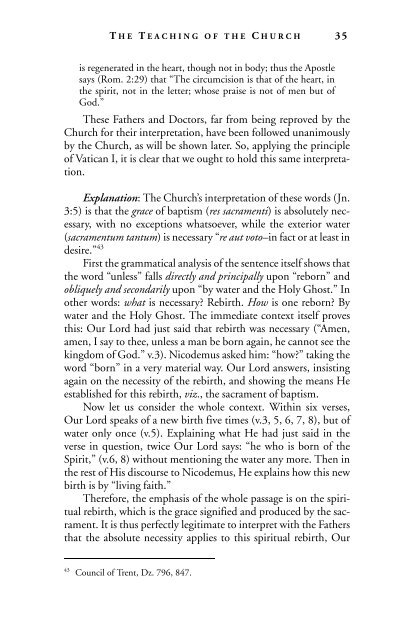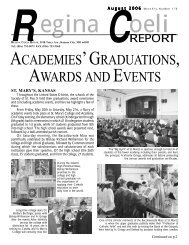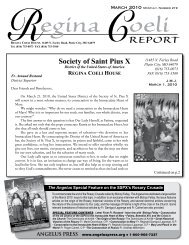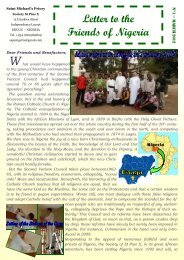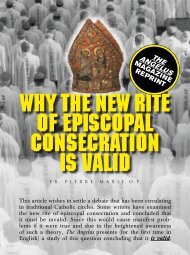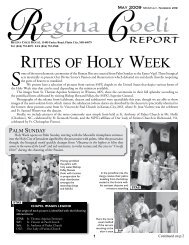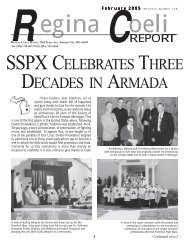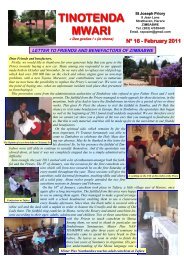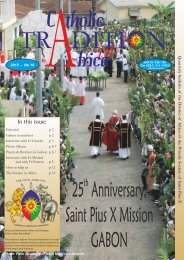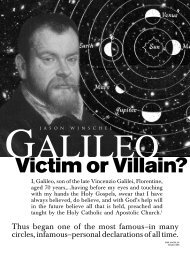Is Feeneyism Catholic? - Society of St. Pius X
Is Feeneyism Catholic? - Society of St. Pius X
Is Feeneyism Catholic? - Society of St. Pius X
You also want an ePaper? Increase the reach of your titles
YUMPU automatically turns print PDFs into web optimized ePapers that Google loves.
T HE TEACHING OF THE CHURCH 35<br />
is regenerated in the heart, though not in body; thus the Apostle<br />
says (Rom. 2:29) that “The circumcision is that <strong>of</strong> the heart, in<br />
the spirit, not in the letter; whose praise is not <strong>of</strong> men but <strong>of</strong><br />
God.”<br />
These Fathers and Doctors, far from being reproved by the<br />
Church for their interpretation, have been followed unanimously<br />
by the Church, as will be shown later. So, applying the principle<br />
<strong>of</strong> Vatican I, it is clear that we ought to hold this same interpretation.<br />
Explanation: The Church’s interpretation <strong>of</strong> these words (Jn.<br />
3:5) is that the grace <strong>of</strong> baptism (res sacramenti) is absolutely necessary,<br />
with no exceptions whatsoever, while the exterior water<br />
(sacramentum tantum) is necessary “re aut voto–in fact or at least in<br />
desire.” 43<br />
First the grammatical analysis <strong>of</strong> the sentence itself shows that<br />
the word “unless” falls directly and principally upon “reborn” and<br />
obliquely and secondarily upon “by water and the Holy Ghost.” In<br />
other words: what is necessary? Rebirth. How is one reborn? By<br />
water and the Holy Ghost. The immediate context itself proves<br />
this: Our Lord had just said that rebirth was necessary (“Amen,<br />
amen, I say to thee, unless a man be born again, he cannot see the<br />
kingdom <strong>of</strong> God.” v.3). Nicodemus asked him: “how?” taking the<br />
word “born” in a very material way. Our Lord answers, insisting<br />
again on the necessity <strong>of</strong> the rebirth, and showing the means He<br />
established for this rebirth, viz., the sacrament <strong>of</strong> baptism.<br />
Now let us consider the whole context. Within six verses,<br />
Our Lord speaks <strong>of</strong> a new birth five times (v.3, 5, 6, 7, 8), but <strong>of</strong><br />
water only once (v.5). Explaining what He had just said in the<br />
verse in question, twice Our Lord says: “he who is born <strong>of</strong> the<br />
Spirit,” (v.6, 8) without mentioning the water any more. Then in<br />
the rest <strong>of</strong> His discourse to Nicodemus, He explains how this new<br />
birth is by “living faith.”<br />
Therefore, the emphasis <strong>of</strong> the whole passage is on the spiritual<br />
rebirth, which is the grace signified and produced by the sacrament.<br />
It is thus perfectly legitimate to interpret with the Fathers<br />
that the absolute necessity applies to this spiritual rebirth, Our<br />
43 Council <strong>of</strong> Trent, Dz. 796, 847.


